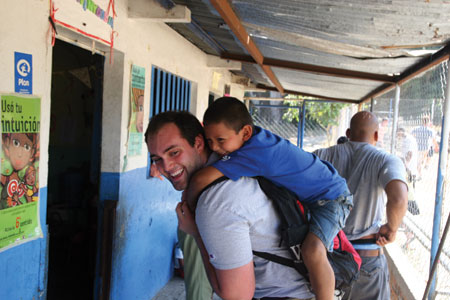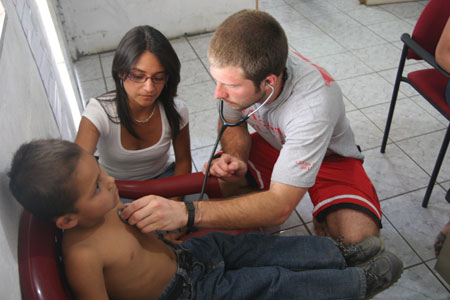Beyond Words |
| Printer-friendly version | Email this article |
|
When they talk about their medical mission trip for the College’s chapter of the Foundation for the International Medical Relief of Children (FIMRC), juniors Jake Ezell and Alex Moseman hone in on the same moment. “It’s the event that changed my entire perspective,” says Moseman, a photographer, political science major, and the son of a doctor—but with absolutely no interest in becoming one himself. “This was the day that confirmed it—I knew there had to be a better way to prepare to be a doctor than just going hard at it in labs and on your GPA,” says Ezell, an empathetic pre-med student determined to find a way “to make a difference now.”  Last March, both were making a difference in a hot, crowded clinic in Las Delicias, El Salvador. A young boy who had fallen while playing had split open his lip—a screaming gash. His mother tried to soothe him while calming herself. The Salvadoran doctor carefully probed the wound with gentle, slender hands, and treated it well enough that they could go on to the hospital. But as soon as the boy heard the word “hospital,” he wailed. The mother, unable to afford treatment, trembled for her son’s pain and her own inability to fix it. She pulled him closer to herself but turned his face away so that he could not see her tears. Last March, both were making a difference in a hot, crowded clinic in Las Delicias, El Salvador. A young boy who had fallen while playing had split open his lip—a screaming gash. His mother tried to soothe him while calming herself. The Salvadoran doctor carefully probed the wound with gentle, slender hands, and treated it well enough that they could go on to the hospital. But as soon as the boy heard the word “hospital,” he wailed. The mother, unable to afford treatment, trembled for her son’s pain and her own inability to fix it. She pulled him closer to herself but turned his face away so that he could not see her tears.“I was assisting Dr. Lopez—we called her ‘Doctorcita’—but there was really nothing I could do,” says Ezell. “One minute he’d been playing, and now he was hurting. I wanted to pat him on the back or muss his hair, just something to let him know I’d been in the same situation, that he would be okay.” It was a different dilemma for Moseman. As a photojournalist covering the trip to raise funds and interest alumni in future missions, he knew this could be “the shot” of the trip. “I couldn’t believe this was happening,” Moseman recalls. He thought of the day he had spent as an intern with Indianapolis Star award-winning photographer Matt Dietrich his freshman year through the College’s Quality of Life in Indiana grant. “I remember asking him what he didn’t like about being a photographer, and he told me about these times when terrible things happen to people but your job is to tell people about that, to make people more aware. “And I was there to bring an entirely different world back for people to see, to record something and have it make a difference in people’s lives.” AS THE BOY WHIMPERED in his mother’s arms, Ezell did the only thing he could. “I put my hand on his shoulder and left it there for a while. I don’t know if it helped, but I think the mom could see that we felt for him. Sometimes a touch is all you have to offer, but it can be more intense than talking. You’re thinking more carefully about how you communicate.” “Seeing the tears in that mother’s eyes and hearing her child cry was a crystallizing moment,” Moseman says. “I knew how she felt—we’re both human beings, the sound of her child crying was the same as any baby in the U.S. No matter where we’re from, we all feel the same things. “For a split second, I felt conflicted, but I knew I needed to record this. It was a very important moment of the trip, so the photographer in me kicked in: How do I get the best shot, portray the right mo-ment? But I was choked up as I was taking the pictures. “After I took them, I made the conscious decision to get outside and photograph some kids at play.” But Moseman wasn’t content to spend the entire trip behind the lens. “I wanted to be involved in everything we were doing.” And while that included plenty of medical and health-related tasks, Moseman and the other Wabash men—Ezell, Barrington Hodges ’10, Josh Pederson ’12, and Dylan Andrews ’12—spent hours just playing with the children.
“I couldn’t speak more than 20 words of Spanish before we went down there, so sometimes all we could do with the kids was play. I didn’t have any trouble communicating with people, because we could point and smile and laugh about things. We didn’t need words.” One smile in particular Moseman will never forget. Although the burly Sphinx Club member expected to administer vaccines and make presentations, he never imagined performing pre-natal exams. But that’s exactly what the Wabash students found themselves doing by the end of their week in Las Delicias. “They taught us to imagine a grid on the mother’s stomach, where we could find the baby’s feet, where we could expect to find the heartbeat,” says Moseman, who found himself stepping into an expectant mother’s small concrete-block house with Dylan Andrews and an assistant from the community. The woman lay down on her bed in the dimly lit room as Moseman pushed her T-shirt back to expose her belly and, as carefully as he could, searched for signs of life. “The first five seconds felt very awkward. It was hot. I was sweating. I put my hands on her stomach and felt the baby’s feet. I put the stethoscope where they’d told us, and that’s right where [the heartbeat] was.” Moseman smiles as he recalls the moment. “It’s the first time I’d ever heard a baby’s heartbeat—that quiet, rushing sound. Incredible. “I looked up at the woman and said, ‘Bueno, bueno,’ and nodded. She smiled back, just like any happy expecting mom would. “It was the most amazing week I ever experienced. I think I grew more as a person and in my understanding of the world than I ever have. I took everything I’ve learned in the last three years at Wabash, went down there, and it all clicked.”
|

